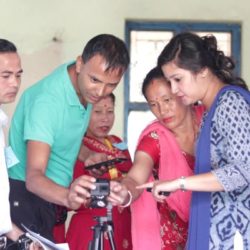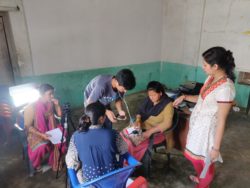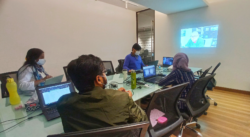Participatory Video Training: Can it be done online?
 As part of our COSTAR project CE4AMR aimed to scale up the use of Participatory Video (PV) to explore AMR at community level. The PV method hinges on the values of equitability and co-production to create films which represent community level knowledge on AMR. Films can act as advocacy tools and art in their own right whilst also sharing knowledge on AMR challenges and solutions.
As part of our COSTAR project CE4AMR aimed to scale up the use of Participatory Video (PV) to explore AMR at community level. The PV method hinges on the values of equitability and co-production to create films which represent community level knowledge on AMR. Films can act as advocacy tools and art in their own right whilst also sharing knowledge on AMR challenges and solutions.
In January 2022 team members from the University of Leeds (UK) and HERD International (Nepal) were all set to travel to Bangladesh and deliver a full week of PV training to our ARK Foundation partners. Here our post-doctoral research fellow Nichola Jones discusses how we delivered the training package, and the inevitable interruptions of COVID-19’s omicron variant.
Plans for PV training

The HERDi Team taking part in PV activities in 2019. Photo Credit: HERDi
As part of a post-doctoral research fellowship, I was asked to plan and deliver a 1-week training programme on participatory video (PV) research methods in partnership with our Nepal-based team at HERD International (HERDi). The training was initially intended to be delivered in-person at the ARK team’s Dhaka office in Bangladesh. However, the Omicron variant of the COVID-19 pandemic, made this impossible. We were forced to adapt our plans to deliver training online which meant key challenges in terms of facilitation and also the complex matter of juggling international time differences!
Hello Omicron!
With just a week to go before the planned trip the Leeds and HERDi teams threw ourselves into working on an adapted timetable that could be delivered online via zoom. We wanted to make the most of time being blocked out in people's diaries but the adaptation was extremely challenging not least because of the spike in Omicron cases across all settings and the uncertainty of whether team members would be working at home or in their offices.

An example of PV workshops happening face-to-face in our previous pilot project. Photo Credit: HERDi
One major challenge in this adaptation was in imparting the core values of co-production and shared learning through a medium which doesn’t inherently promote innovative styles of learning and sharing. With a very short timeframe for adapting workshop content, we had to carefully consider our use of time and resources. We also needed to be mindful of the way rooms were set up to minimize COVID-19 transmission but also allow ARK team members to engaging in filming activities. This resulted in a very different set-up from how we have delivered PV sessions in previous project, for example with everyone crowded around a camera. However we really wanted to keep the interactive nature of the sessions and allow the ARK team time to hone their skills and reflect on the support they needed from HERDi and Leeds.
Online learning made interactive

The ARK team's office set-up for online PV training: Photo Credit: ARK Foundation
Though tricky, we found that the best way to make the week as active and engaging as possible was to set tasks and activities for our participants during the morning sessions (UK overnight). These activities were based around key video-making techniques and principles, so the ARK team were able to develop interviewing and filming skills independently using our written guidance. Then, in the afternoon (UK morning) sessions, we came together to review their experiences and footage then work through key aspects of a PV in AMR workshop programme.
We were lucky that, during this week, there were no major technical issues, so we were able to facilitate these sessions using screen sharing and a shared OneDrive folder. Though this experience was challenging, I think that we managed well given the late notice change in delivery method. For our team, this was the first time we’d delivered this type of training over zoom. I feel that this experience gave me an idea of how we might be able to adapt the delivery of these training sessions in the future to reach wider audiences.
What next?
The Omicron wave in Bangladesh is starting to subside and there is hope that our ARK colleagues will be able to head into the field and test their new skills as soon as possible. ARK team members will then facilitate two iterations of PV following our project manual which can be freely accessed here. All team members are currently reflecting on this training and the online support package we have developed, although less engaging than face-to-face sessions we do hope this package can be repurposed to train other teams that may not have the time or resources to travel.
The COSTAR project
 Our COSTAR project is a £2million collaboration between the University of Leeds (UK), ARK Foundation (Bangladesh) and HERD International (Nepal) along with other international partners. Our aim is to robustly evaluate community level interventions to address AMR in Nepal and Bangladesh over the next two years. A key component of the project is the use of participatory video to share knowledge on AMR and create triggers for dialogue at community level.
Our COSTAR project is a £2million collaboration between the University of Leeds (UK), ARK Foundation (Bangladesh) and HERD International (Nepal) along with other international partners. Our aim is to robustly evaluate community level interventions to address AMR in Nepal and Bangladesh over the next two years. A key component of the project is the use of participatory video to share knowledge on AMR and create triggers for dialogue at community level.
